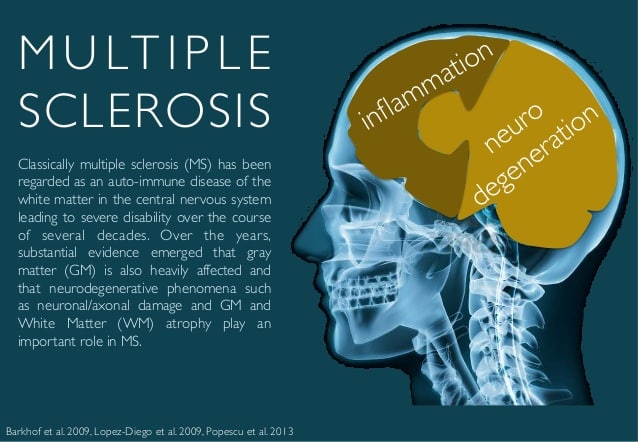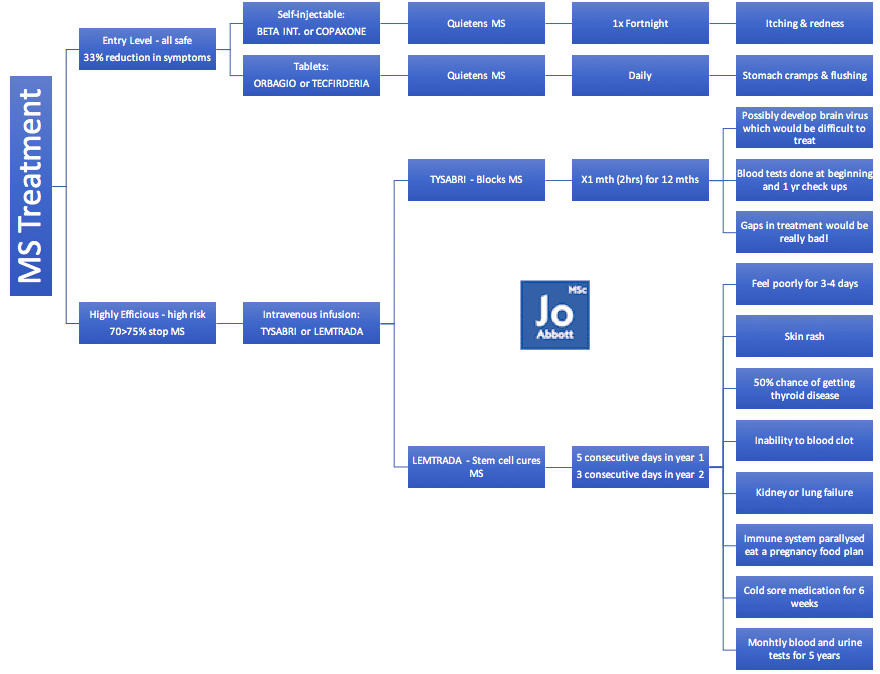
What is Multiple Sclerosis (MS)?
Multiple Sclerosis (MS) is an autoimmune disease where the automatic immune system attacks the central nervous system because it thinks it’s a foreign substance. The Central Nervous System (CNS), brain and spinal cord, is the system of nerve tissues. Nerve tissue controls voluntary (walking) or involuntary (breathing) activities for vertebrates, like you and I.
What happens in the body?
When the immune system attacks the spinal cord it damages the outer layer (myelin sheath) of the nerves and causes inflammation in small patches (plaques or lesions). These eventually become scar tissue (sclerosis). All these changes in the CNS can be seen on Magnetic Resonance Imaging (MRI).
Breaking down
The myelin sheath protects and insulates nerve axons so that nerve impulses do not ‘leak out’. So if this outer layer is damaged it can cause chaos with the messages that travel along the nerve. The damage can; restrict the speed of the message, jumble the content, send the message to the wrong place, or stop them getting through completely. The attack on the CNS can cause widespread symptoms such as; disability, bladder and bowel problems, confusion and fatigue, to name but a few symptoms. The analogy of how electrical current would leak out of a broken wire supported my wife’s understanding of this damage.


Diagnosis of MS
Multiple Sclerosis is diagnosed mainly in young adults. In many cases, it’s possible to treat symptoms. Average life expectancy is slightly reduced for people with MS and it is generally a lifelong condition that can either have serious or mild consequences, pending the diagnosis:
- Relapsing Remitting: 8 in 10 MS Patients are diagnosed with RRMS. They experience episodes of new or worsening symptoms generally with no warning. Illness and stress have been reported to drive relapses. Relapses typically worsen over a few days, last for days to weeks to months, then slowly improve over a similar time period. Relapse – Remission cycles.
- Secondary Progressive: 50% Patients with RRMS may go on to develop SPMS. Symptoms gradually worsen over time without obvious attacks. Some people continue to have infrequent relapses during this stage.
- Primary Progressive: 1 in 10 MS Patients are diagnosed with PPMS, symptoms gradually worsen and accumulate over several years, and there are no periods of remission, symptoms may stabilise.
So we now know what MS is; what it attacks; and the consequences of this attack, now it's important to understand what does the diagnosis of MS means to the individual and their families?
Effects of diagnosis
My Wife. A beautiful independent, strong disciplined woman. A great sense of humour (some may say ‘very dry’) was aged 35 when she was diagnosed with RRMS. For most of her working life she has been an Entrepreneur. Currently, her career consists of monthly Worldwide travel and lots of contact with people, and a need for good balance on a day-to-day basis. Her symptoms that initiated the investigations were; loss of balance, temperature sensitivity of the left leg, black fingers, bowel conditions, lactose & gluten intolerance, and fatigue.
For my wife: the immediate threat of loosing her career was ever evident. To be licensed in her career she is now required to pass a medical every year (it was every 5 years before diagnosis of MS). RRMS being as unpredictable as reported this raises/raised many concerns for us. If this wasn’t a big enough blow to her independence she also has her Driving Licence revoked every year pending medical investigations and the opinion of the Consultant. All of this takes time out of her very busy schedule to arrange, but also there are costs implicated to each investigation for the medicals.
For immediate family & friends: initially upset & confusion regarding MS (mostly due them consulting with Dr. Google whilst reading the terrifying headlines captured by Journalists used to sell papers/blogs). Our friends are not aware of my wife’s condition. Family have gone through many 180 flips on the emotions, progressing from anger to understanding.
For me: as a Scientific Researcher I was confused, frustrated, and completely mortified with the whole process, which i shall share with you in time.
Informed decisions
In 2015, my wife was told she had an ‘aggressive, high contrast and unpredictable sizeable lesion’ (Consultant’s Terms) in her right frontal lobe. The right frontal lobe is the part of the brain that controls important cognitive skills in humans, such as emotional expression, problem solving, memory, language, and judgment. It is, in essence, the “control panel” of our personality and our ability to communicate. I was slowly losing my wife: all that I loved was slowly disappearing day-by-day. She became unrecognisable.
The journey
In summary, her ‘Control Panel’ for decision making was switched off, she was prescribed (and taking) Amitriptyline for the temperature sensitivity of the left leg – which was holding her in an emotionally numb state, and now she was being asked to make informed choices on the rest of her life.
Below is a flow chart I wrote during the second appointment with the MS Consultant. This was what she had to make an informed decision on.

-
There are so many mechanisms involved in squatting, some of these mechanisms are fundamental to the human design, others blow off the cobwebs and allow us to keep moving safely and efficiently. Reducing squatting exposes the joints to premature aging; knees, hips, ankles, spine, and pelvis.
-
Thumb joint corrects foot pain! Seriously?
I know, crazy right? I must be mistaken? It has to be some kind of black magic? I'm pain-free because of some other factor? It must be psychosomatic?To be honest, I have heard it all now. What's important? My wrist is pain-free enabling me to get back to a normal life after 2 years of pain!



0 responses on "What is Multiple Sclerosis?"